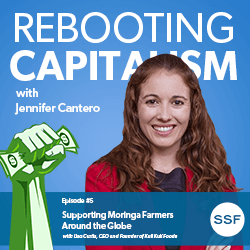
Episode #5 — Supporting Moringa Farmers Around the Globe
Lisa Curtis, CEO & Founder at Kuli Kuli Foods
Agriculture has a huge impact on the planet – we all have to eat, after all. And while right now a lot of the impact is negative, we can use agriculture to create positive changes for the planet and the many people who support themselves by tending it. This week, we’re joined by Lisa Curtis of Kuli Kuli Foods to talk about how her company is leading the way with this approach.
Show Notes
Agriculture has a huge impact on the planet – we all have to eat, after all. And while right now a lot of the impact is negative, we can use agriculture to create positive changes for the planet and the many people who support themselves by tending it. This week, we’re joined by Lisa Curtis of Kuli Kuli Foods to talk about how her company is leading the way with this approach.
Kuli Kuli Foods got its start when Lisa was working in Niger as part of the Peace Corps. When she was lacking nutrition, she asked some of the women in her community what she could eat to feel better and have more energy. They introduced her to moringa, which Lisa quickly learned was packed with nutrients. What followed was a collaboration between Lisa and moringa farmers to bring the ingredient to bigger markets in a sustainable, transparent, and ethical way.
In this episode, Lisa tells us the story of Kuli Kuli Foods and how it is helping small farmers around the world access big food markets like the US. We chat about the benefits of moringa, why it’s important to form entrepreneurial partnerships that empower people around the globe, and what other food manufacturers can do if they want to invest in small share farmers, too. We also discuss regenerative agriculture and the vision for Kuli Kuli’s future.
- How Lisa was introduced to moringa and why the community wanted to create a market for growing it.
- Why moringa is a climate smart crop that benefits farmers, consumers, and the planet alike.
- How Kuli Kuli Foods uses language that is respectful and not patronizing to its partners in its marketing.
- What other food manufacturers can do if they want to support small farmers and increase the demand for sustainably produced ingredients.
- What moringa tastes like and what’s next for Kuli Kuli’s product lines.
What You'll Learn
Links Mentioned
Disclaimer
Rebooting Capitalism is a podcast sponsored by Sensiba LLP. The statements, discussions, opinions, and other commentary provided within the program are solely intended for discussion purposes and do not constitute legal or professional advice. Listeners and participants should seek independent legal or professional advice. The views and opinions expressed in this podcast are those of the host and guests and do not necessarily reflect the views or positions of Sensiba LLP. Sensiba LLP does not assume any responsibility or liability for the accuracy, completeness, or reliability of any information discussed within the program.
By accessing or participating in the program, listeners and participants agree to these terms and conditions, acknowledging that they have read and understand the disclaimer and agree to be bound by its provisions.